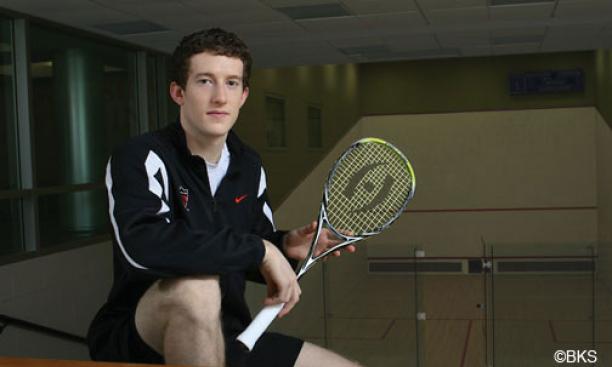

Todd Harrity ’13 first held a squash racquet at age 5, when he tagged along with his parents to the courts at the Merion Cricket Club outside Philadelphia and they showed him how to play. Last year, at age 20, he became the first American player in 21 years to win the national college championship in a sport dominated by non-American players. He is one of the top men’s squash players in the United States, and may head for a professional career after graduation.
On the court, Harrity is reserved and soft-spoken, but beneath that calm lies a resolve to dominate any opponent. When he arrived at Princeton, he played very consistently and rarely made errors. Lately, he has overhauled key elements of his game to bolster his offense.

“He’s incredibly focused, and he hates to lose,” said head squash coach Bob Callahan ’77. “When he gets his mind on something, he just works and works on it. He knew if he wanted to be the best, he needed to make this change, and he wasn’t going to wait a whole season.”
Coach and player share two alma maters. In addition to Princeton, both attended Episcopal Academy in Newtown Square, Pa., a day school with a strong squash tradition. Good coaching and international competition prepared Harrity for his collegiate career.
After ending last season 20–0 — he lost just two games out of 62 — Harrity had stretched his winning streak to 26 matches when he lost 3–2 Jan. 15 to Harvard sophomore and Egypt native Ali Farag, the runner-up in the 2010 World Junior Championships.
The defeat “energized him,” said Callahan. “It’s exciting to have competition.”
Despite Harrity’s loss, the Tigers, ranked No. 3, prevailed 5–4 over Harvard, which had been undefeated. Princeton’s strong veterans have been joined by promising freshmen Samuel Kang of Singapore and Tyler Osborne of Canada. After beating Brown 9–0 and No. 1 Yale 8–1 but falling to Trinity (which recently ended a 14–year winning streak), the team was 10–1 and 5–0 in the Ivy League as of Feb. 6.
Harrity is focused on his collegiate play, but he also is giving some thought to a professional career after Princeton. Playing on the squash circuit would take him all over the world, which would be a thrill, he said.
“Being professional in a sport you love to play — not many people get to do that,” he said.
